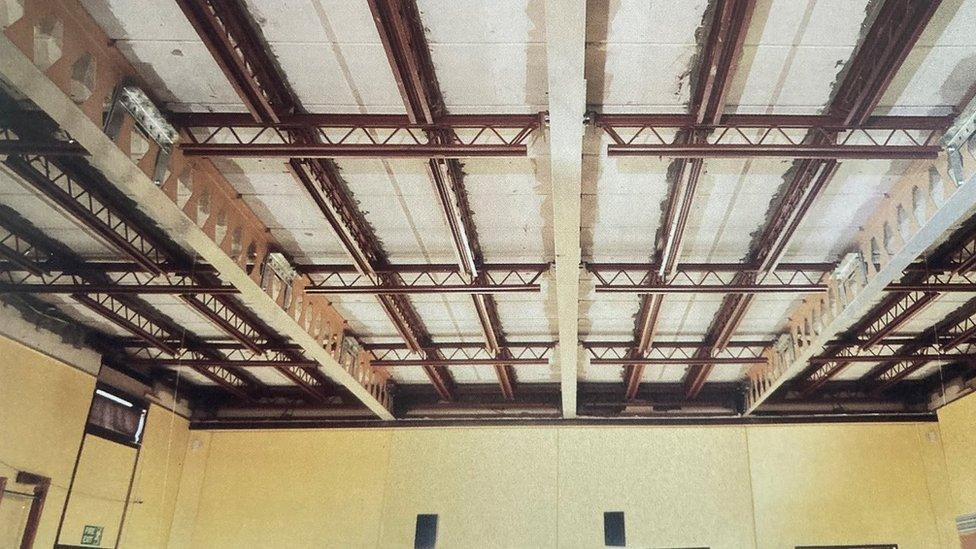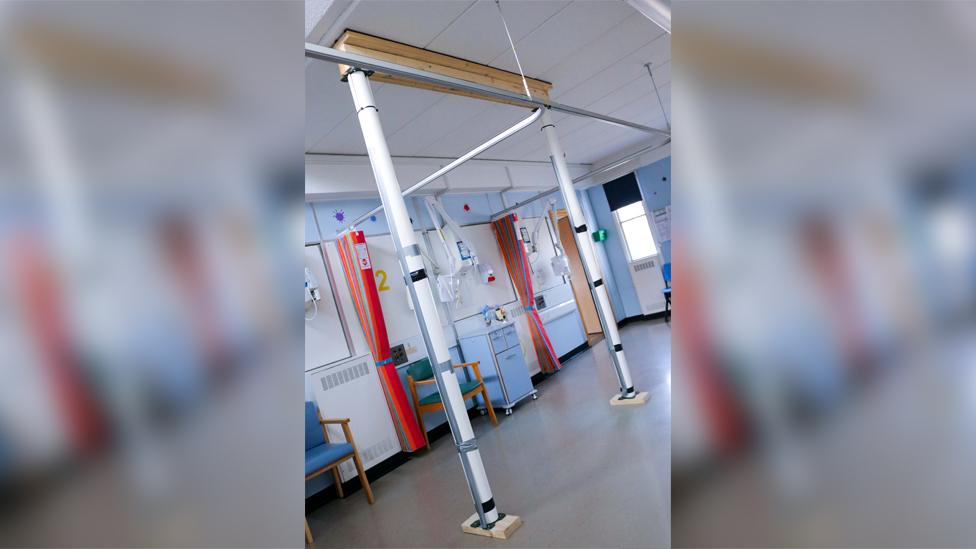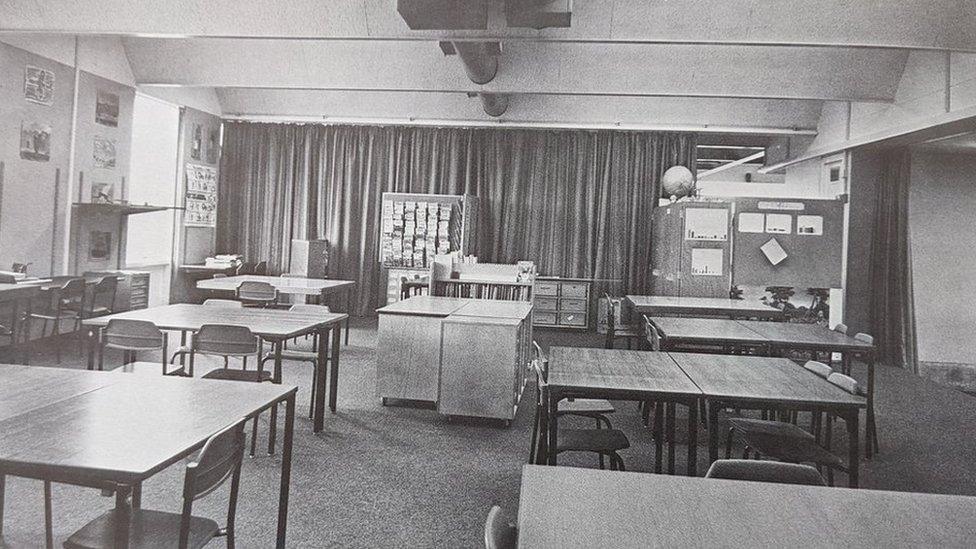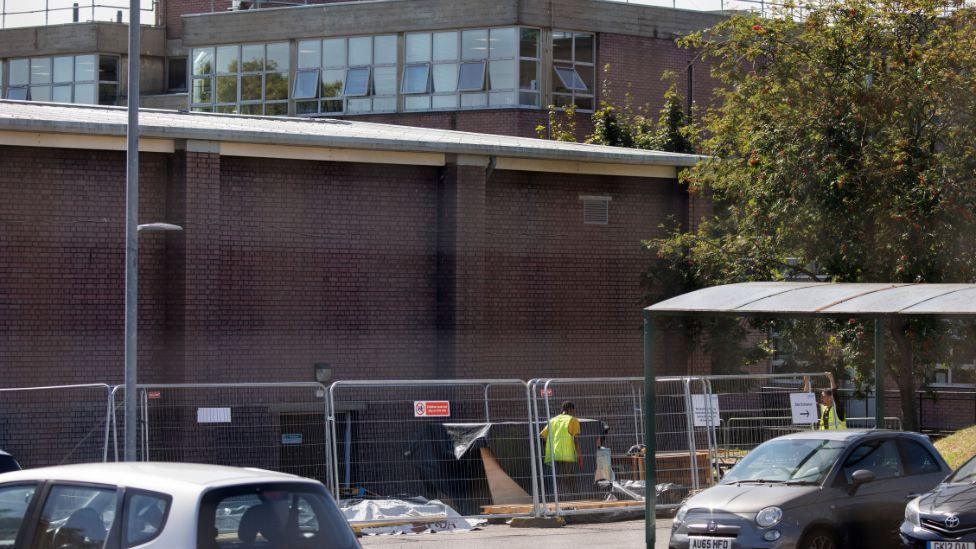The Essex schools Raac repair programme halted in 2012
- Published

John Hare said his design has helped schools built using Raac to remain open
A "money saving" programme to remediate Essex schools affected by reinforced autoclaved aerated concrete (Raac) was dropped in 2012, it has been claimed.
People involved in the project said budget cuts were to blame.
More than a third of the 147 schools identified as having Raac in England are in Essex.
Essex County Council said it had addressed problems at the worst affected schools by 2006 and that many became academies since then.
The BBC has seen invoices and Freedom of Information Act disclosures showing how a number of the council's schools back in the early 2000s had their Raac roofs reinforced by a company called Metsec.
John Hare, who designed a key component in the steel frame-based system, showed the BBC documents suggesting more than 30 were remediated in this way between 2000 and 2012.
He had received information the programme was axed because of budget cuts, he said.

A brochure for the Metsec system shows how its system supported roofs constructed from Raac
"The unforeseen cost of repairing the Raac was burning a hole in the Essex [County Council] maintenance budget and Essex had to concentrate on waterproofing the school roofs, which had been neglected," Mr Hare added.
"Essex asked for additional funds from the government, but that was not forthcoming, so they could not continue with the Raac [maintenance] programme."
This was echoed by another source also involved in the project, who the BBC has spoken to.
The schools maintenance budget was slashed by two-thirds in 2012 "due to the reduced level of capital grant received from the Department for Education" according to council papers.
Analysis of the council's spending declarations show payments to Metsec ceased the same year and Mr Hare's company accounts also show income tailing off during the same period.
The Metsec system used a steel latticework frame to support Raac planks in school roofs.

Harlow's Conservative MP Robert Halfon visited a local primary to see how the metal latticework system worked
Mr Hare's company, Precise Air Lifting Systems Ltd, designed and supplied a part of the structure.
"We came up with a patent to not only repair them but stabilise them for life," he said.
"I'm really disappointed. The schools that are now in trouble could have been saved."
Mr Hare, from Ashwell in Hertfordshire, worked with Metsec but was not one of its employees. The company, whose full name is Voestalpine Metsec, declined to comment.
Dancing head teacher
One of the Raac schools which was remediated using the Metsec frame, featuring Mr Hare's product, was Harlowbury Primary in Harlow.
Local MP Robert Halfon visited it, external to see how it had been able to open for the start of term.
Angus Drummond's company, Raac Consulting and Solutions, inspected its roof.
He said the head teacher "danced" when his colleagues delivered the good news.
"Our structural engineering team told us we could remove our hard hats and that the school was effectively safe," said Mr Drummond.
Another, Great Tey Primary near Colchester, told parents their children could come to school as normal because, according to its website, external, "whilst Raac is present in our school roof, we have steel a reinforcement structure called Metsec in place which eliminates the possibility of collapse".

Angus Drummond, who works for a Raac consultancy, said surveys indicated the Metsec system had held up well
A Metsec brochure from the early 2000s described how the metal cradle removed the need to replace affected roofs, stating "it could save Essex County Council alone millions of pounds and have national implications".
It said the work did not disrupt classes as it could be carried out quickly at night.

'We agreed a contract but it was stopped'

The Queen Elizabeth Hospital agreed to work to remediate its RAAC problem on a ward but pulled out
Britain's most-propped hospital - the Queen Elizabeth (QEH) in King's Lynn in Norfolk - commissioned the Metsec system and paid for the materials but abandoned the project in 2011.
Invoices show Mr Hare's company was paid £17,000 for its share of the work, but he said the hospital chose not to proceed.
"We had a great input with the hospital. We supplied the material and agreed a contract. It was stopped, even though the material had been delivered and invoiced," he said.
"The material sat there for two and a half years."
Paul Brooks, director of estates and facilities at the hospital, said: "For many years the QEH has been working with leading structural engineering experts to gain a better knowledge of Raac and how it functions.
"The trust has Raac in both the ceiling and walls of our main building, and in 2011 we were in the early stages of understanding the full extent of Raac in our estate.
"Consequently we were advised by structural engineers against the option of a roof-only fix.
"It was recommended we form a full strategy to tackle Raac in the walls and roof simultaneously."

A spokesman for Essex County Council said: "In 1999 we undertook a large mapping exercise to identify where Raac existed across Essex County Council's schools' estate and following this, surveys were undertaken to establish its condition.
"Works to address Raac were then initiated and prioritised based on the condition of the material. These works involved either replacing the Raac panels or installing a support system.
"Sites that had Raac which were identified as being of poor or below-average condition were addressed as a priority, and this work was completed by 2006.
"A rolling programme of monitoring surveys was put in place to manage any sites that had not yet been remediated. During this time, some schools in Essex with identified Raac became academies and the academy trust became the responsible body for their school buildings."
A spokesman for the Department for Education said: "We are working with schools, college leaders and responsible bodies in Essex, including Essex County Council, to make sure that where children are affected, disruption is kept to a minimum.
"On top of funding support for Raac, we have allocated over £15bn since 2015 to improve the condition of schools across the country and, as part of this, the Essex local authority has been allocated £7.9m for its maintained schools this year alone."

Follow East of England news on Facebook, external, Instagram, external and X, external. Got a story? Email eastofenglandnews@bbc.co.uk, external or WhatsApp us on 0800 169 1830
- Published16 September 2023

- Published15 September 2023

- Published11 September 2023

- Published7 September 2023

- Published5 September 2023
